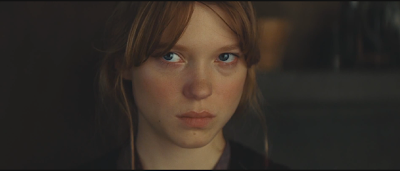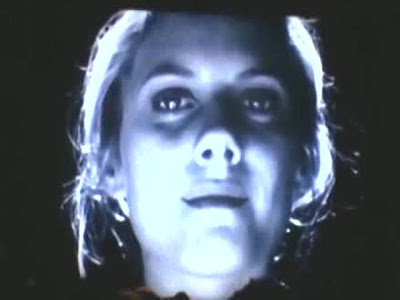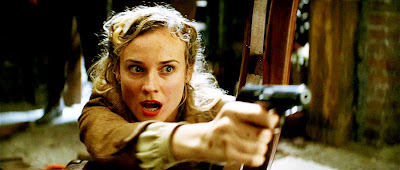The 'heroes' of Inglourious Basterds are heroic because of the cause they fight for rather than how they fight. These are bastards who are incontrovertibly inglorious.
The film shows the corrupting nature of hatred in war and how it effects both sides. The Basterds are unnecessarily violent - the marking of prisoners, the taking of scalps - and demonstrate a psychopathic glee at the brutal beating of a Nazi soldier. In short, they are Lieutenant Aldo Raine's disciples of death:
"We will be cruel to the German and through our cruelty they will know who we are"

This echoes the teachings of Jesus, telling his disciples that people would know them, and hence God, through their actions.
Just as Colonel Landa equates the Jews with rats so too do the Basterds perceive the Nazis as defined by their ideology...
"Did you get that for killing Jews?"
"Bravery"
...stripped of all common humanity and transformed physically by a pervasive otherness:
"Say goodbye to your Nazi balls!"
At the same time the ideology of the Nazis is given a blithely clear-headed and dispassionate voice in the shape of Hans Landa. He presents their ideas as instinctual, thoughts and feelings that the Nazis can negotiate with no more than the general populace can negotiate with the strictures of the fascist regime. It's just the way things are:
"You don't really know why you don't like them, all you know is you find them repulsive"
"Talented as your negro may be, you will operate the projector"
The killing of the Nazi high command by the Basterds, locking them in as if locking the gas chamber doors and shooting down on the screaming and faceless antlike masses from above, is final evidence that there is nothing edifying in this war and all are tainted by it. Heroism is scarred, permanently disfigured.
Tarantino, therefore, adds welcome nuance to traditional hero-villain cartoon dichotomies while managing to skilfully sidestep the trap of moral relativism.
However, paradoxically, the film's greatest strength may well be its defining and fatal weakness: we are left with nobody to care for. The comic capers, the close shaves and the copious blood-letting succeed or fail on the basis of an audience association with these people. From the moment the Basterds murder, intimidate, mock and scalp, the overwhelming sensation can only be that of repugnance.
By the end this becomes numbness as Shoshanna's cackling visage robs herself of the humanity the Nazis seek to rob her of. She is not a new Joan of Arc for France to worship. She is not a martyr forged in the flames but an exterminating angel.
One moment of elusive tenderness and warmth sticks in my mind, though. It is a close up of one of the farmer's daughters Charlotte (Lea Seydoux, below). It is a study worthy of the Dutch masters upon whose luminous colour palette the opening farm scene draws. Her eyes are alive with fear, concern and love. It is a face of real emotion that comes to be obliterated by the 'Giant Face' of revisionist vengeance (more on that anon).

'Giant Face', the chapter title that refers to Shoshanna's unexpected appearance on screen, could be rewritten as 'Giant Identity'. It is a powerful assertion of who Shoshanna is and of her right to be.

For the characters in Inglourious Basterds the essence of their identity is paramount. Landa loves his "unofficial nickname" precisely because he has "earned it". The way he is seen chimes with his own view of himself. This pleases him. Archie Hicox, too, when his British identity is uncovered, embraces it fully:
"If this is it old boy, I hope you don't mind if I go out speaking the King's".
Zoller can't bear to watch himself on the cinema screen, perhaps because it is a misrepresentation of who he is or more likely because of its painful accuracy. These characters want to be known for who they are (Lt. Raine also goes out of his way to mention the little 'Injun' in him) and when they try to escape who they are (by vowing to burn their Nazi uniforms) they are branded.
With the theme of identity so strong in this film, it is a shame that Tarantino, a man who made his name off the back of the supposedly singularly vibrant energy of his films and their larger-than-life characterisations, creates a film that is so formal and contrived that it lacks a compulsive identity.
The dialogue is repetitious and wants for spontaneity. The characters are involved in a tightly choreographed ballet with clogs on. The language is clumsily poetic ("facts can be so misleading where rumours, true or false, are often revealing") and self-conscious, as if filtered through two foreign languages. Scenes have little spark because everything is so controlled. Tension creates a vacuum but cannot live in one.
The film advances as a succession of set-pieces rather than as a coherent flow. Only Christoph Waltz, as Hans Landa, brings life to this aridity, loosening the tight leash that constrains the film and creating a personality that is ruthless, childlike, a Prince Charming (who knows whom the shoe fits) with an intellectual acumen to be reckoned with.
He is, in many ways, playing Tarantino, teasing and probing, always one step ahead, always relishing the foreplay as much as the climax:
"Wait for the cream"
Wait for the cream is an apt description of the tactics employed by the film in its set pieces - ten minutes of build until the inevitable release. Characters play games of identity with each other both for real or in make-believe (with historical figures stuck to their foreheads). The film entire could be seen as one long anticipation of a final cathartic immolation.
I believe, though, that Tarantino's style, in no small way, discredits his subject. Take for instance the revelation of the Jews hiding under the farmer's floorboards. In the midst of an anxious exchange the camera swirls around Landa and the farmer and then pans down beneath the floorboards to show the Jewish Dreyfuses paralysed with fear. This turns horror into a flourish. Instead of just showing them, or pointing us directly to them, Tarantino takes us on a mini fairground ride.
It is in the tone of the piece too that Inglourious Basterds is weakened. Seriousness and tomfoolery are unhappily married throughout. In the first interview / interrogation scene Landa brandishes a comically large pipe, prompting the farmer to look at it bemusedly as if forgetting the terrible situation he finds himself in.

Furthermore, there is a friction of two conflicting moralities in the audience: Real-life morality and 'Movie morality'. When watching Kill Bill, one can accept and revel in the slaughter 'The Bride' visits on those she has wronged; but if we were to hear of such actions in real life, we would find them abhorrent.
We accept that there are differences between these two mindsets. Where a moral conundrum arises is in the no-man's land created by a filmic representation and reimagination of well-known and well-understood real-life events. It doesn't start with a blank slate. What it omits to mention we are impelled to fill in from History.
The redemption and the triumph are hollow. Zoller is redeemed in Shoshanna's eyes by his image on the screen but it is a lie. Inglourious Basterds may not be propaganda but, by sweeping so much under the carpet, it is just as misleading and just as dispiriting to watch.
The farmer's daughter in that first scene pulls back a white sheet to reveal the Nazis and at the end of the film a different white sheet will be used to erase again from view the evil of the Nazis : the Cinema Screen. We see reality lead fiction by the hand and then fiction lead reality.

When it obscures months and years of suffering Inglourious Basterds gives us an empty false feeling of triumph. We burn our imaginations in the cinema (in this case 350 nitrate films) to warm the cold of reality but the smoke has a putrid stench to it.
Would we welcome Superman preventing the terrorist attacks of September the 11th on the Silver Screen? Would we celebrate with him?
What is it, then, that allows Tarantino to change REAL history and REAL tragedy so readily? Is it because many have trodden on this ground before? Is it because of the time that has passed? Or is it that World War II has been so adapted and so reimagined as to pass into the very stuff of fiction itself, there to become another trope, another template, a genre like any other?
Inglourious Basterds begged the question as to whether Tarantino was exploring World War II simply so that he could up-scale his revenge fetish.
* * *
The mythologising of historical cataclysms and the cataclysms themselves were born as twins - it has always happened and it always will. These myths can say important things but the message can be compromised and distorted. Basterds wants it both ways: to have us revel and reflect, to mourn and make merry, to relish the same things we deplore.
I could have gone with it if I were sitting in a cinema in the 1940s, desperate for inspiration and hope - but in 2009 I just couldn't. The reason it fails is that the film never veers from its collision course with high entertainment - with shocks and guffaws.
I wasn't turned off by the concept in the abstract (I had enjoyed the script beforehand) but by this execution of it. In summation, Inglourious Basterds is a largely unimpressive and uncomfortable work.
*Whose beginning is heralded by a beautifully unresolved phrase of Fur Elise and the farmer's symbolic cleansing of his hands and face, a la Pontius Pilate


Sorry for the delay Stephen, but thisis a fantastic piece on the film. Although my stance on the movie is completely different, I found this piece completely logical and riveting. Especially this:
ReplyDelete"The farmer's daughter in that first scene pulls back a white sheet to reveal the Nazis and at the end of the film a different white sheet will be used to erase again from view the evil of the Nazis : the Cinema Screen. We see reality lead fiction by the hand and then fiction lead reality."
and the section on license to change history.
Superman preventing 9/11? Interesting.
Thanks for the kind comments. I was interested in your thoughts because of how riveting I found your own piece.
ReplyDeleteThe film left me cold but it did get me thinking.
Hi, just stumbled on your blog...
ReplyDeleteI watched this film the other week and it was totally different from the one I was expecting...at least from the trailers that I saw beforehand.
I wasn't disappointed, though - as I found it very unusual and worthwhile watching - at least I went away thinking about it and it did make an impression.
Maybe it's just me, but you know when you suddenly wake up from one of those disjointed dreams...that seem really surreal when you try to piece them together again? I'm guessing that this may be how certain very old people who were around during World War II recall the war - some after a lifetime of consciously trying to shut out traumatic events.
*Please note, I'm not talking about those Nazis who can clearly remember what they did - and calculatingly lie about events.
The closing scene of the movie - although extremely violent (it is a Tarantino movie after all) makes a very pertinent comment about the way that the vast majority of Nazi war criminals were able to hide back into society after the war once they took their uniforms off.
Rebecca
"For the characters in Inglourious Basterds the essence of their identity is paramount. Landa loves his "unofficial nickname" precisely because he has "earned it"."
ReplyDeleteTowards the close when Aldo Raine (I think?) questions him about it, embarrassed, he awkwardly shrugs it off by hastily protesting: "It's just a name that stuck..." This comes across as both hideous bad taste 'funny', but ultimately we think: what a sick loser - shades of the glorious Mel Brooks take on the pathetic Nazis here?
Interesting blog...
Rebecca
You spent and awful lot of time on a film you despise. You seem to be trapped in a joyless world of political accountability and reductionism.
ReplyDeleteThank you for the comments, Rebecca.
ReplyDeleteA very interesting thought:
"Maybe it's just me, but you know when you suddenly wake up from one of those disjointed dreams...that seem really surreal when you try to piece them together again? I'm guessing that this may be how certain very old people who were around during World War II recall the war - some after a lifetime of consciously trying to shut out traumatic events."
I'm soliciting bloggers' favorites (of their own posts) for my year-end round-up at The Dancing Image. Here's the explanation (with a bit of a mea culpa):
ReplyDeletehttp://thesunsnotyellow.blogspot.com/2009/12/best-of-blogosphere.html
Feel free to leave your own selection there - links to all submissions will be posted around the 30th, but I'll certainly be taking them after that too.
Thanks & happy new year!
P.S. On a personal note, I loved your kickoff piece, on Fire Walk With Me. But I've handed the baton off - choose away! (We know which one Davy would choose, apparently... by the way, still haven't seen this; after I do, I'll probably go back and read the numerous and fascinating-looking essays on it which have accumulated...)
A very good, thought-provoking piece. Truth be told, I've always found Shosanna's laughing at the end odd: Would she really film herself going "Hahahahahahahahahaha!" for minutes on end?
ReplyDeleteBut by then the movie had well won me over. The jugging of tones would have been off-putting to me had IB been overtly about war. I don't think Tarantino's film is about war though, so much as war movies, particularly how six decades of movies about the Great War have created a mythos that has permeated our collective memory: war is righteous (when "we" wage it); Nazis are stupid and non-human; Jews were passive victims; Americans always ride in to save the day. "Inglourious Basterds" upends all these cliches while showing empathy for everyone -- even "strangely persuasive monsters" like Zoller. More than that, Tarantino shows empathy for several cultures and languages from a completely different time; and I think his dialogue, which grows organically, reflects that leap.
Just my two cents. Like I said, great piece.
Thank you for the comments, Craig
ReplyDeleteI see what you mean about it being about war movies not war and about the upending of cliches. That's what I was driving at talking about the war having 'passed into fiction'.
You make some very good points that I agree with. Only those thoughts took me in a different direction to you.
Still, the film didn't really grab me enough on any level, if I'm being honest.
Davy, I don't despise the film. There were one or two issues I had with it that managed to sour my experience.
ReplyDeleteI've seen the basterds yesterday and - to me - one thing is for sure:
ReplyDelete"Say goodbye to your nazi-balls" is the not just the best phrase but also the peak of the best scene (french cellar pub) of the whole movie.
P. S.
"Ich bin Winnetou, der König der Apatschen"
That moment certainly has 'impact', philgeland!
ReplyDeleteI don't know if you did this on purpose but the ad at the bottom of this post is for a "Holocaust Tour." BeyondBandofBrothers.com I didn't click it but that doesn't meant that everyone else shouldn't.
ReplyDelete---
Thanks for participating in the My Best Post Blog-a-Thon. Your link (and some nice words from me) will be posted on Friday. Please take some time to comment on some other people's posts who's participated.
Thanks,
Gringo
He-Shot-Cyrus.blogspot.com
Thanks, Gringo. I'll be sure to have a look.
ReplyDeleteNo, I didn't choose to put that ad there - it generated it randomly from the content.
Just arrived here from the "He Shot Cyrus" best post blog-a-thon. This is absolutely FANTASTIC. This piece is fantastic and deep and makes me look at the movie in a whole new light. Not to mention some kind of smart...you make me feel ashamed to revel in my ignorance in loving this movie. But ashamed in a good way!
ReplyDeleteLovely and amazing, you genius. Basterds is one of the few movies I turn over in my head, thinking of every possible analysis and explanation, but this is a new one to me. Excellent.
ReplyDeleteThank you very much Marshall.
ReplyDeleteYou have no reason to be ashamed and I have every reason to feel a little embarrassed!
Thanks, Simon.
ReplyDeleteI'm glad you got something from what I've written here.